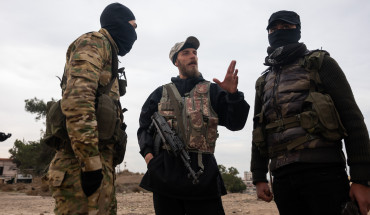A commander of the Popular Mobilization Forces (P.M.F.) - the Iraqi paramilitary forces also known as Hashd al-Shaabi - has announced that the operation to liberate Tal Afar region in western Mosul will begin soon after the end of Ramadan. According to Fars News Agency, which is affiliated with the Islamic Revolution Guards Corps (I.R.G.C.), Nazim al-Assadi also claimed that foreign powers are trying to delay the operation in Tal Afar and along the Iraqi border with Syria. “There is complete coordination between the armed forces of Syria and the Iraqi forces, including Hashd al-Shaabi, and American missile launchers near al-Tanf crossing in Syria will not delay efforts by Iraq and Syria to maintain security along the shared borders,” he maintained. He accused the U.S. military of deploying the military hardware in southern Syria to disrupt cooperation between Syrian and Iraqi forces.
Separately, the P.M.F. forces yesterday launched another operation in northeastern parts of Baqubah, the capital of Iraq’s Diyala Province. According to Fars News Agency, the objective of the operation is to pursue and expel Islamic State “sleeper cells” in the region.
Comment: The P.M.F.’s potential participation in Tal Afar operation is troubling. The strategic town, located about 40 miles west of Mosul, could prove to be a dangerous flashpoint for post-Islamic State sectarian violence and proxy wars between regional countries, particularly Iran and Turkey.
Tal Afar has been a major Islamic State stronghold since 2014. Once inhabited by both Sunnis and Shiites, the population in the Turkmen-majority city is now largely Sunni. The P.M.F. forces – which are dominated by groups supported by Iran – have played a prominent role in the military campaign against the Islamic State in western Mosul. In recent months, P.M.F. forces have captured strategic regions in western Mosul, took the control of an army airbase outside Tal Afar, and recently reached the Syrian border.
The P.M.F.’s increasing role in western Mosul, particularly in Tal Afar, has been a matter of grave concern for Iraqi Sunnis and regional Sunni leaders, who have repeatedly expressed the worry that Iran-backed sectarian groups may engage in revenge killings against Tal Afar’s Sunni inhabitants once the Islamic State is ousted. Turkey, in particular, has warned that it would not remain silent to the P.M.F.’s advances into Tal Afar. While some P.M.F. units are Iraqi nationalists and follow Iraq’s top cleric Grand Ayatollah Ali Sistani, what makes Iraqi Sunnis and regional Sunni states particularly worried is that, despite P.M.F.’s diversity, it is the Iran-backed militia units that are playing a leading role in western Mosul.
Iranian-backed Iraqi paramilitary forces have long sought permission from the Baghdad government to be allowed to move in to Tal Afar, or at least be part of the operation to liberate the town.
Last month, however, a prominent Iranian-backed Iraqi Shiite militia leader confirmed that the Hashd al-Shaabi will not take part in the military operation to recapture the strategic city of Tal Afar from the Islamic State. “Our forces will not participate in this operation due to pressure by Turkey, America and some other countries that support Daesh [Islamic State],” said Jawad al-Talibawi, a spokesman for the armed wing of Asaib Ahl al-Haq, a Shiite Iraqi militia group with close ties to the Islamic Revolution Guards Corps (I.R.G.C.).
But according to the Iranian media, Iraqi Prime Minister Haider al-Abadi said over the weekend that Sunni and Shiite P.M.F. units will participate in the Tal Afar operation, which is set to begin in the coming days.
The Middle East Institute (MEI) is an independent, non-partisan, non-for-profit, educational organization. It does not engage in advocacy and its scholars’ opinions are their own. MEI welcomes financial donations, but retains sole editorial control over its work and its publications reflect only the authors’ views. For a listing of MEI donors, please click here.













